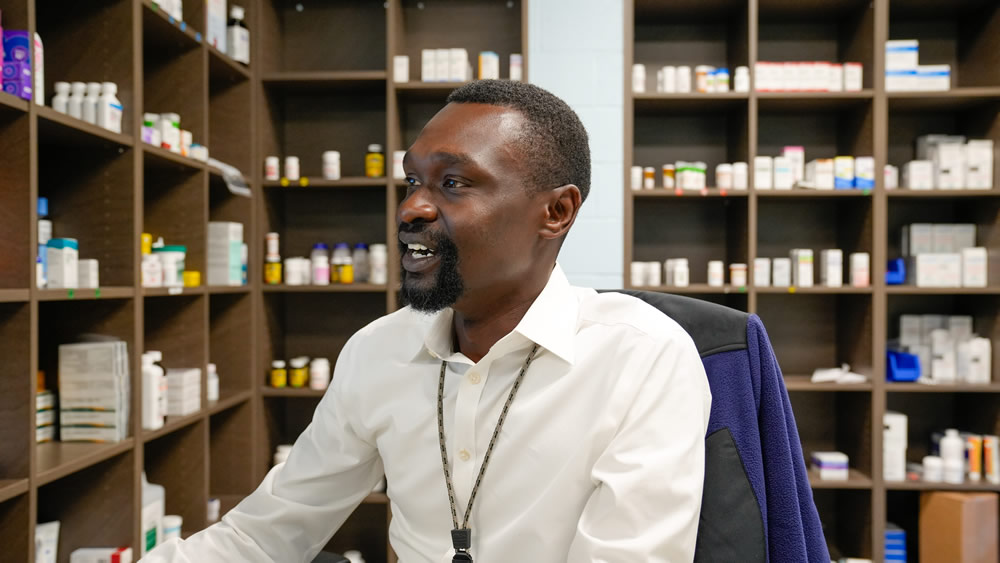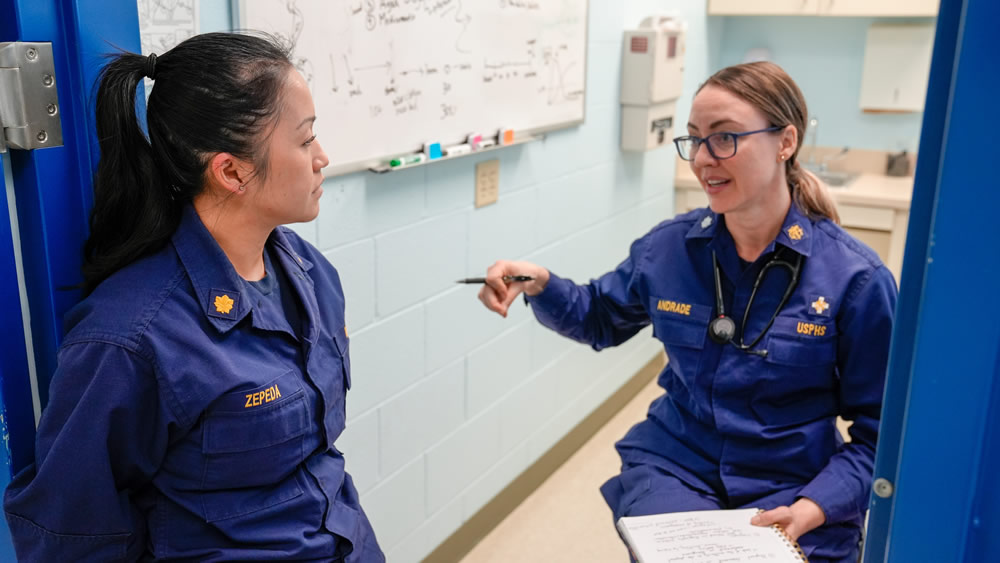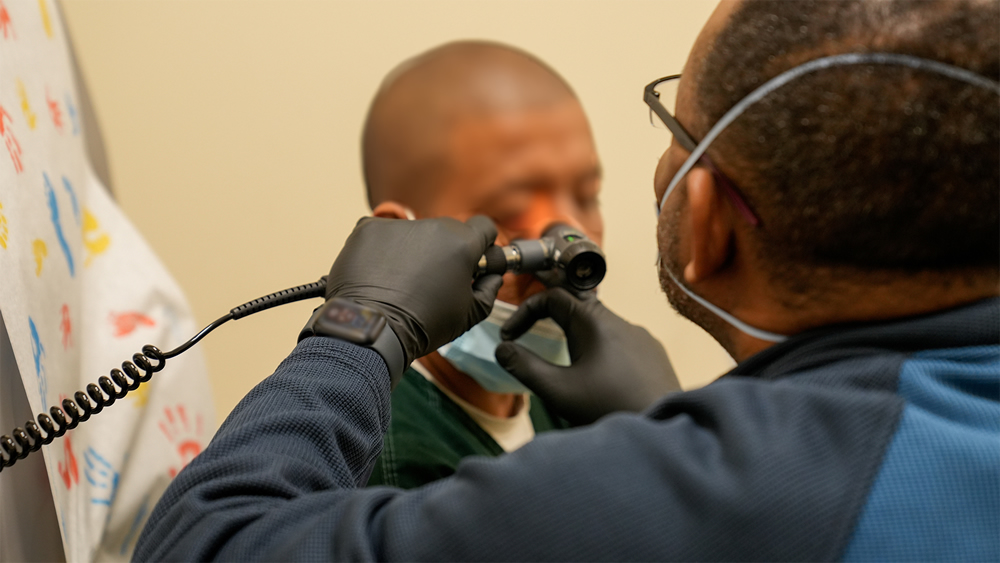
ICE Health Service Corps Changes Lives and Perceptions by Delivering Quality Health Care
The challenges noncitizens face when coming to the U.S. are endless. Many noncitizens endure dangerous conditions as they journey to the border. They may suffer from dehydration and injuries upon arrival; many have histories of preexisting medical conditions or mental health issues and have never received medical care. In fiscal year 2022, ICE had a $302.2M budget to provide medical care to those in custody.
Physical Care
Lt. j.g. Brittani Stonionis, an ICE Health Service Corps nurse at the Houston Contract Detention Facility, volunteered to go to Donna, Texas — on the Southwest Border — for the IHSC COVID Pandemic Special Mission in July 2021. She helped test new arrivals for COVID-19.
Stonionis said many of the families who arrived needed medical care.
“Some of them had amputated arms,” she said, “so some of them were in rough shape, and it's kind of surprising that these people still decided to make this huge journey over here.”
Noncitizens within IHSC-staffed facilities receive timely medical care that includes a health screening within 12 hours of arrival and a complete health assessment within 14 days. IHSC-staffed facilities provide medical care 24 hours a day, seven days a week, for direct patient access.
Often, the care that detained noncitizens receive while in ICE custody is the first professional medical care they’ve ever had. Routine health screenings commonly identify chronic and serious health conditions that were previously undiagnosed.
Lt. Cmdr. Mark Jones is a field medical coordinator at ICE’s Port Isabel Processing Center in Los Fresnos, Texas. In his role, he’s seen many desperate situations.
“We have the chance to talk to people. Some have mentioned that they've never seen a dentist in their life,” Jones said. “There are so many aspects of health care that they've never seen. Some of them come from rural areas and have never seen a physician.”
In fiscal year 2022, IHSC administered and managed a health care system that provided direct care to more than 118,400 noncitizens detained at 19 designated facilities nationwide. These sites provided medical, dental, mental health care and public health services. Additionally, IHSC oversaw compliance with health-related standards in 163 contract facilities, which are staffed by non-IHSC personnel, that housed more than 120,500 detained noncitizens in ICE custody.
Mental Health
IHSC’s mission is to safely deliver high quality health care to detained noncitizens in ICE custody. In October 2020, in response to growing need, IHSC established its Behavioral Health Care Continuum to provide access to multiple levels of care and treatment to its patients.
Capt. Indira Harris is chief of the IHSC Behavioral Health Unit. She says one of the unit’s biggest challenges is seeing more patients with increased levels of severe mental illness.
Harris said COVID has impacted individuals’ mental health, which has likely contributed to the increasing number of people at facilities with psychological and behavioral issues. A great deal of this was due to anxiety and uncertainty about the pandemic, loss of loved ones, health-related concerns, and a host of other bio-psychosocial challenges.
“You have people who are more exposed to traumatic situations as they are trying to get to this country, and they're going from one country to the next, to get to the United States,” Harris said. “They have been exposed to trauma, such as human trafficking, medical trauma, intimate partner violence, community violence — a number of very challenging and often horrific experiences along the way.”
IHSC behavioral health provider Lt. Barsham Murphy said that a social worker’s main priority is to serve.
“You may be the light at the end of the tunnel for someone who has experienced feelings of hopelessness, or feeling as though their situation is hopeless. It’s a process of trying to guide them to what to expect,” Murphy said. “Let them know that things will be okay. You will make it through this process — and as you go through this process, myself and my team will be here to support you.”
In 2022, 5,936 noncitizens required intervention and further mental health services.
Two ICE detention facilities have dedicated mental health units to accommodate detained noncitizens with unique behavioral health needs: the Krome Behavioral Health Unit and the Adelanto ICE Processing Center. ICE’s goal is to provide transitional mental health care for eligible noncitizens while promoting greater security and accountability.
Changing Perceptions
As chief of the IHSC Behavioral Health Unit, Harris says one of her main goals is to change the public’s perception of ICE.
"Many people don't have a lot of experience with ICE beyond what they hear on television, and so they often think we don't care about the treatment our patients receive,” Harris said. “A lot of the work I do in my role is shattering those myths and going out into the community and networking with our external stakeholders, educating them on what we do.”
That misperception also carries over to noncitizens coming to the United States.
IHSC Health Service Administrator Cmdr. Elizabeth B. Russell oversees the Houston Contract Detention Facility’s medical unit. She ensures daily clinic operations follow national accreditation standards and that all noncitizens have access to compassionate health care services.
Russell says many noncitizens have a hard time when they realize they are in a detention facility and face removal.
“Being apprehended, housed at a detention facility, and then returned to their country is not part of their original dream, plan or goal,” Russell said. “For some patients, building initial trust with the medical personnel can be challenging and requires extra effort from the medical staff.”
Russell recently encountered a noncitizen limping in the hallway who seemed to be in pain. She asked him about his limp and discovered that while he was enjoying the recreational time all ICE detainees receive, he sustained a minor injury while playing sports. The man hesitated to seek treatment because he didn’t know whether he would have to remain in custody longer due to a medical condition. Many noncitizens in ICE custody are unsure what affects their cases before they speak to officials, but the reality is that IHSC staff provides quality treatment regardless of the length of someone’s stay.
“I provided information that helped clarify his misunderstanding. He went to the clinic to be seen and received needed treatment,” Russell said. “A few days after he was seen by medical and when I saw him again in the hallway, he was very thankful for the information and assistance received by the medical staff. He also expressed his gratitude for being in the Houston Contract Detention Facility, where he had everything he needed.”
IHSC Core Services
The IHSC comprises a diverse workforce that includes physicians, psychiatrists, social workers, dentists, registered nurses, medical assistants and other health professionals who manage and operate ICE health care. In fiscal year 2022, IHSC managed care for noncitizens from over 230 countries, many of whom were previously living with undiagnosed or untreated medical or behavioral health conditions.
You can learn more about the IHSC and its dedicated health care professionals on the IHSC website.
IHSC Careers
Are you interested in a career that provides for the health, safety and welfare of a diverse and fluid population of noncitizens in custody?
Learn more about working for ICE and see our open positions.




